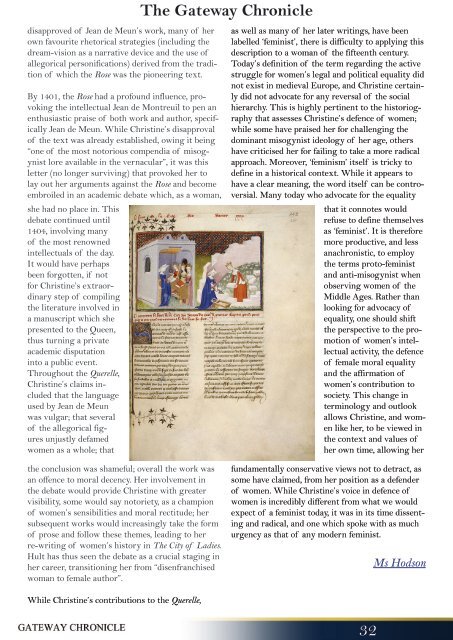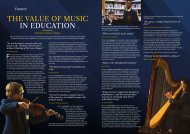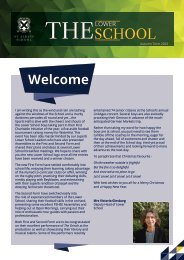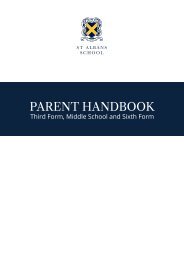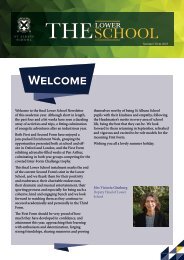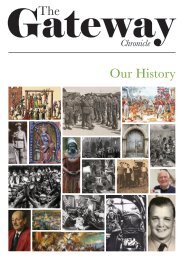You also want an ePaper? Increase the reach of your titles
YUMPU automatically turns print PDFs into web optimized ePapers that Google loves.
32<br />
disapproved of Jean de Meun’s work, many of her<br />
own favourite rhetorical strategies (including the<br />
dream-vision as a narrative device and the use of<br />
allegorical personifications) derived from the tradition<br />
of which the Rose was the pioneering text.<br />
By 1401, the Rose had a profound influence, provoking<br />
the intellectual Jean de Montreuil to pen an<br />
enthusiastic praise of both work and author, specifically<br />
Jean de Meun. While Christine’s disapproval<br />
of the text was already established, owing it being<br />
“one of the most notorious compendia of misogynist<br />
lore available in the vernacular”, it was this<br />
letter (no longer surviving) that provoked her to<br />
lay out her arguments against the Rose and become<br />
embroiled in an academic debate which, as a woman,<br />
she had no place in. This<br />
debate continued until<br />
1404, involving many<br />
of the most renowned<br />
intellectuals of the day.<br />
It would have perhaps<br />
been forgotten, if not<br />
for Christine’s extraordinary<br />
step of compiling<br />
the literature involved in<br />
a manuscript which she<br />
presented to the Queen,<br />
thus turning a private<br />
academic disputation<br />
into a public event.<br />
Throughout the Querelle,<br />
Christine’s claims included<br />
that the language<br />
used by Jean de Meun<br />
was vulgar; that several<br />
of the allegorical figures<br />
unjustly defamed<br />
women as a whole; that<br />
The <strong>Gateway</strong> <strong>Chronicle</strong><br />
as well as many of her later writings, have been<br />
labelled ‘feminist’, there is difficulty to applying this<br />
description to a woman of the fifteenth century.<br />
Today’s definition of the term regarding the active<br />
struggle for women’s legal and political equality did<br />
not exist in medieval Europe, and Christine certainly<br />
did not advocate for any reversal of the social<br />
hierarchy. This is highly pertinent to the historiography<br />
that assesses Christine’s defence of women;<br />
while some have praised her for challenging the<br />
dominant misogynist ideology of her age, others<br />
have criticised her for failing to take a more radical<br />
approach. Moreover, ‘feminism’ itself is tricky to<br />
define in a historical context. While it appears to<br />
have a clear meaning, the word itself can be controversial.<br />
Many today who advocate for the equality<br />
that it connotes would<br />
refuse to define themselves<br />
as ‘feminist’. It is therefore<br />
more productive, and less<br />
anachronistic, to employ<br />
the terms proto-feminist<br />
and anti-misogynist when<br />
observing women of the<br />
Middle Ages. Rather than<br />
looking for advocacy of<br />
equality, one should shift<br />
the perspective to the promotion<br />
of women’s intellectual<br />
activity, the defence<br />
of female moral equality<br />
and the affirmation of<br />
women’s contribution to<br />
society. This change in<br />
terminology and outlook<br />
allows Christine, and women<br />
like her, to be viewed in<br />
the context and values of<br />
her own time, allowing her<br />
the conclusion was shameful; overall the work was<br />
an offence to moral decency. Her involvement in<br />
the debate would provide Christine with greater<br />
visibility, some would say notoriety, as a champion<br />
of women’s sensibilities and moral rectitude; her<br />
subsequent works would increasingly take the form<br />
of prose and follow these themes, leading to her<br />
re-writing of women’s history in The City of Ladies.<br />
Hult has thus seen the debate as a crucial staging in<br />
her career, transitioning her from “disenfranchised<br />
woman to female author”.<br />
fundamentally conservative views not to detract, as<br />
some have claimed, from her position as a defender<br />
of women. While Christine’s voice in defence of<br />
women is incredibly different from what we would<br />
expect of a feminist today, it was in its time dissenting<br />
and radical, and one which spoke with as much<br />
urgency as that of any modern feminist.<br />
Ms Hodson<br />
While Christine’s contributions to the Querelle,


